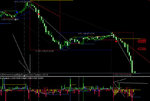AvantEdgeFX
Junior member
- Messages
- 48
- Likes
- 4
Profit Taking..
Hi Charles;
Your question has been a conversation I've had w my clients and brokers many times over the past couple decades..
The markets offer opportunity… but exploiting them is a bit of a misnomer because like a casino, I'd agree with your friend that you'd get kicked out of the casino. But, we generate substantial returns and stay away from this caution tape, it all depends on the strategy. If you're trading at times where there are higher volumes of 'non directional movements' (ranges).. as opposed to trying to scalp a given direction you're safer.
If you're trading when there's a spike, and only when there are spikes and you're profiting consistently… you're on the watch list.
You're in the banks playground and it's nothing less than a casino for them. So trade equally in higher volumes where prices are less directional, (or at least have a strategy that does), and respect them without giving them the proverbial sore thumb.. of toxic trade flow, then you'd be alright.
In terms of size… well, make sure you're trading with a broker that truly is connecting you to an ECN ( tight pricing, no fixed spreads ), and if that's the case be sure that they don't trade against you. But be respectful to their liquidity, Oanda is notorious for closing accounts on successful traders… but that's because they take the opposite side of client trades like the big retail firms do. It's their casino.
So, if you're trading where liquidity isn't going to get repeatedly insulted then you're safe.
I found the above post quite interesting. Maybe you can answer a question for me please. I was just chatting with a colleague about trading success. He said it would be impossible for me to take out substantial amounts from the market. That the brokers would be withdrawing liquidity if I was constantly making serious money.
My argument against was that they may be able to go for your stops, but they cannot really reverse the market down if the trend is up as that may tip the balance again.
Is that really the case? Does this apply to ECN brokers also? I can understand someone like IGindex or Capital Spreads doing this.
How large a size a trader consistently trade PROFITABLY before they begin to monitor your accounts?
What can they do to restrict your trading when they begin to monitor your accounts?
I am sure there are traders who take out millions from the market without any problems. Not quite there yet but it is just interesting to know how the whole thing works and what forces are at play.
Any ideas??
Hi Charles;
Your question has been a conversation I've had w my clients and brokers many times over the past couple decades..
The markets offer opportunity… but exploiting them is a bit of a misnomer because like a casino, I'd agree with your friend that you'd get kicked out of the casino. But, we generate substantial returns and stay away from this caution tape, it all depends on the strategy. If you're trading at times where there are higher volumes of 'non directional movements' (ranges).. as opposed to trying to scalp a given direction you're safer.
If you're trading when there's a spike, and only when there are spikes and you're profiting consistently… you're on the watch list.
You're in the banks playground and it's nothing less than a casino for them. So trade equally in higher volumes where prices are less directional, (or at least have a strategy that does), and respect them without giving them the proverbial sore thumb.. of toxic trade flow, then you'd be alright.
In terms of size… well, make sure you're trading with a broker that truly is connecting you to an ECN ( tight pricing, no fixed spreads ), and if that's the case be sure that they don't trade against you. But be respectful to their liquidity, Oanda is notorious for closing accounts on successful traders… but that's because they take the opposite side of client trades like the big retail firms do. It's their casino.
So, if you're trading where liquidity isn't going to get repeatedly insulted then you're safe.
Last edited:






